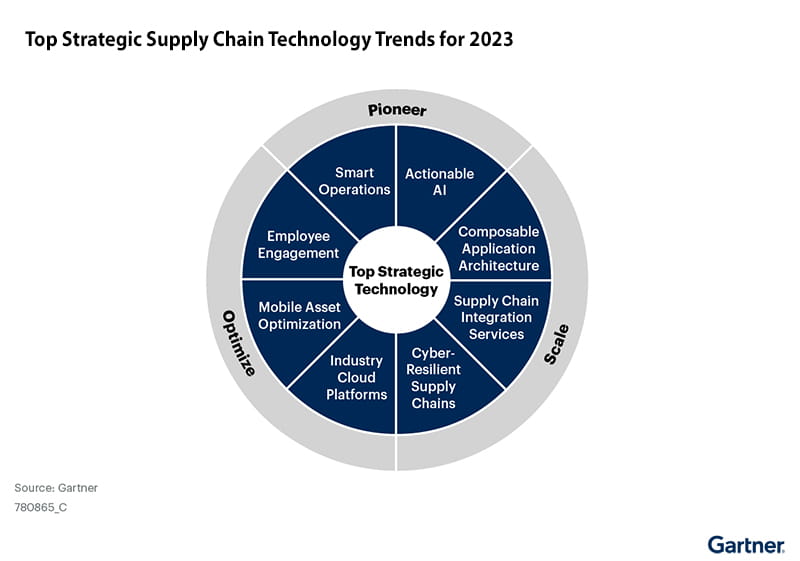How to drive Efficiency & Innovation in Logistics with Digital Transformation
In the era of digital transformation, logistics leaders are presented with the challenges to revolutionize their industry and drive unparalleled efficiency, productivity, and customer satisfaction. As the driving force, CIOs need to play a pivotal role in the integration of technology and business strategy, as a key for shaping the success of logistics organizations.
According to Gartner, 73% of the supply chain IT budget will be allocated to driving business growth and enhancing performance by the supply chain organizations.

By embracing innovative technologies, fostering collaboration, and aligning with business objectives, leaders can position their organizations at the forefront of digital transformation.
Let’s look at some of the key challenges faced by CIOs of Logistics Industry-
1. Data management: The logistics industry generates vast amounts of data from various sources, including shipments, inventory, routes, and customer information- managing and analyzing this data effectively to gain valuable insights and drive operational efficiencies is the common challenge faced by CIOs of logistics enterprises.
2. Complex IT infrastructure: Logistics operations often involve multiple systems and technologies, such as Warehouse Management Systems (WMS), Transportation Management Systems, Fleet Tracking, and Supply Chain Analytics. CIOs must deal with the complexity of integrating and maintaining these systems, ensuring smooth data flow and interoperability.
3. Cybersecurity: With increasing digitization and interconnectedness, logistics enterprises become more vulnerable to cyber threats. CIOs need to prioritize cybersecurity measures and develop robust strategies to protect sensitive data, prevent breaches, and ensure business continuity.
4. Adoption of emerging technologies: CIOs face the challenge of evaluating and implementing emerging technologies like blockchain, artificial intelligence (AI), Internet of Things (IoT), and automation. They need to identify the right use cases, manage implementation complexities, and demonstrate the value of these technologies to improve operational efficiency and customer experience.
5. Legacy systems and processes: Most of the logistics businesses still rely on legacy systems and manual processes. Modernizing these systems and processes to keep up with industry trends, streamline operations, and leverage the benefits of next-gen technologies, is critical for realizing positive business benefits in record turnaround time.
Here are the top benefits of accelerating Digital Transformation for Global Logistics Enterprises
1. Enhanced operational efficiency: Digital transformation streamlines and automates processes, reducing the reliance on manual interventions. This optimization leads to notable cost savings and increased productivity for logistics companies.
2. Superior customer experience: By embracing digital technologies, logistics companies can provide improved customer service and support. This includes self-service options, personalized recommendations, and proactive maintenance, fostering higher levels of customer satisfaction and loyalty.
3. Advanced data analytics: Digital tools enable logistics leaders to collect and analyze vast amounts of data from various sources. With these insights, they can make better decisions and optimize their operations
4. Heightened flexibility and agility: Digital transformation empowers logistics organizations to respond swiftly to market changes and customer demands. This flexibility enables the adoption of new business models, and the ability to stay competitive in the face of evolving challenges.
5. Improved safety and reliability: Real-time monitoring of infrastructure enhances safety and reliability in logistics operations. For instance, sensors can detect potential issues before they escalate, and predictive maintenance can prevent equipment failures, ensuring smoother and more reliable logistics processes.
Conclusion
By leveraging innovative technologies, fostering collaboration, and aligning with business objectives, logistics industry leaders can position their organizations at the forefront of digital transformation. It is a journey that requires continuous adaptation and investment in technology, but the rewards are significant in terms of improved efficiency, innovation, and customer satisfaction. Embracing digital transformation is not just an option but a necessity for logistics enterprises to thrive in the digital age.
Espire aims at delivering highly digitized business capabilities for Logistics industry and leveraging advanced technologies to monitor assets and operations to gain competitive advantage by delivering Total Experience (TX)- a sum of Customer Experience (CX), Employee Experience (EX) & Business Experience (BX).

